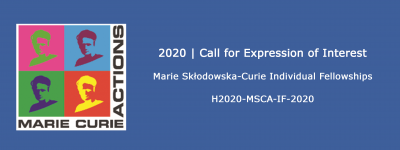2020 Call for Expression of Interest for Marie Skłodowska-Curie Actions Individual Fellowships

Fondazione Bruno Kessler (FBK) is a top Italian research institution based in the city of Trento. Comprising six research centres, FBK’s overall mission focuses on the development and experimentation of human-centric AI systems that collaborate with people, rather than replace them. Fully integrating social science and humanities research in the pursuit of its mission, in 2018 alone FBK has been involved as coordinator and/or consortium partner in 43 successful European project proposals (H2020 and EIT), 24 successful proposals to national and international funding agencies, as well as 52 projects with private companies.
The Centre for Religious Studies (FBK-ISR) has as its mission the advancement of critical understanding of the multi-faceted relationship between religion and innovation in contemporary societies. We engage with innovation in religion, covering texts, traditions, doctrines and institutions, as well as with innovation through religion in the areas of science, technology, business, politics and the law. We take a special interest in the involvement of faith communities in social innovation. We have no agenda for promoting religious reform and we are genuinely interested in religious traditions and traditionalism. The Centre is non-denominational and conducts multi-disciplinary research on the phenomenon of religion across the breadth of its articulations. ISR’s researchers cover expertise in the fields of Philosophy, Sociology, Theology, History, Ethics, Anthropology and Law. Within the Bruno Kessler Foundation, we work together with other research centres and units, in particular with the Centre for Information and Communication Technology (ICT), in developing joint research and innovation projects.
For detailed information on the Centre’s research and action activities please consult our position paper “Religion and Innovation: Calibrating Research Approaches and Suggesting Strategies for a Fruitful Interaction” as well as our booklet “Religion and Innovation at FBK”.
Expressions of interest are now invited from postdoctoral researchers for applying jointly with our Centre for a Marie Skłodowska-Curie Actions (MSCA) Individual Fellowship.
The MSCA Fellowship Programme. The purpose of the MSCA Individual Fellowship (IF) is to support the mobility of researchers and help attract promising foreign researchers to work in the European context (EU Member States and Associated Countries) or outside Europe. The grant typically covers two years’ salary, a mobility allowance, research costs and overheads for the host institution. Individual researchers prepare and submit proposals for funding together with their planned host organisation. Proposals are judged on their research quality, impact and implementation, the researcher’s future career prospects, and the support offered by the host organisation. More information about MSCA Individual Fellowships and the current call is available here.
- Research areas of interest. We welcome expressions of interest in any research area(s) suitable for developing our focus on the interaction of religion and innovation. In line with FBK’s overall strategic commitment to research on, and development of, human-centric Artificial Intelligence (AI) systems, we particularly encourage project proposals that inquire into the interactions between religion and innovations in the field of AI. This said, we also welcome proposals on the interaction between religion and other areas of innovation. In advance of applying, candidates will familiarize themselves with FBK-ISR’s mission, events and projects, as well as the Centre’s position paper. The specific research topic for an MSCA IF application will be designed together with our research group.
- Eligibility and Requirements. Candidates will hold a doctoral degree coherent with their proposed research project, obtained before the MSCA IF deadline of 9 September 2020. Candidates will have excellent teamwork attitude, proactivity as well as organizational skills and ability to work in a multidisciplinary environment. Moreover, candidates will have good problem solving and analytical skills, be fluent in English, have good interpersonal, written and oral communication skills, and be able to work independently as well as within an international team. To ascertain eligibility (especially with regard to the mobility rules for each scheme) and to learn about what will be required of them if selected to apply with us, candidates are required to study the MSCA IF Guide for Applicants.
- Applications. Candidates are invited to express their interest no later than 4 May 2020 at 16.00 CEST by completing the application form and sending it to [email protected]. For further information, please contact our researchers Boris Rähme ([email protected]) and/or Valeria Fabretti ([email protected]).
By inviting your expression of interest, we by no means promise to fund your research or grant you a position. Proposals will be evaluated based on research quality, the researcher’s future career prospects and the availability of suitable supervision. By 11 May 2020, the strongest proposals will be selected for continuation to the MSCA IF application (deadline 9 September 2020). Our scientific team and research funding services will provide support for the preparation of the application.
Further information: